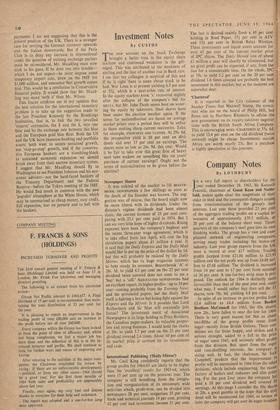Investment Notes
By CUSTOS
THE new account on the Stock Exchange brought a better tone in the equity share markets and continued weakness in the gilt- edged. This was attributed to the weakness of sterling and the fear of another rise in Bank rate. I see that my colleague is sceptical of this and if he is right there is some cheap stock to be had. War Loan is at present yielding 6.3 per cent at 553, which is a near-crisis rate of interest. In the equity markets RANK 'A' recovered slightly after the collapse of the company's bid for MECCA, but Mr. John Davis seems bent on water- ing the equity by takeovers. Steel shares have been under the election weather again. If the terms for nationalisation are based on average market prices over a period they will be unfair to those making sharp current recoveries. Take, for example, STEWARTS AND LLOYDS. At 29s. 6d. the prospective yield is 10 per cent on divi- dends and over 17 per cent on earnings. The shares were as low as 24s. 9d. this year. Would it be fair to take over this great firm of heavy steel tube makers on something like six years' purchase of current earnings? Ought not the terms of nationalisation to be given before the election?
Newspaper Shares
It was unkind of the market to lift BEAVER- BROOK NEWSPAPERS a few shillings as soon as the death of the founder was known. The sug- gestion was, of course, that the board might now be more liberal with its dividends. Under the dictator's regime dividends had been almost static, the current forecast of 25 per cent com- paring with 23.1 per cent paid in 1954. But I can see very little hope of higher dividends. Rising expenses have been the company's bugbear and the recent three-year wage agreement, which is to take effect from last April, will cost the big circulation papers about £1 million a year. It is said that the Daily Express and the Daily Mail would like to put up the price of the dailies by Id. but this will probably be resisted by the Daily Mirror, which has its huge magazine interests to help steady its revenues. Beaverbrook 'A' at 28s. 3d. to yield 4.3 per cent on the 25 per cent dividend twice covered does not seem to me a 'buy' but a 'sell.' ASSOCIATED NEWSPAPERS had an excellent report, its higher profits-up to 10 per cent-coming probably from the Evening News and the provincial papers, but the Daily Mail itself is fighting a brave but losing fight against the Express and the Mirror. Is it possible that Lord Rothermere and Sir Max will eventually join forces? The investment merit of Associated Newspapers is its large holding in Price Brothers, the Canadian paper-makers, its valuable proper- ties and strong finances. I would hold the shares at 20s. to yield 5.7 per cent on the 23 per cent dividend covered 2.4 times. About 60 per cent of its market price is covered by its investments and cash.
International Publishing ('Daily Mirror') Mr. Cecil King confidently reports that the group profits for 1964-65 are likely to be higher than the 'excellent' results for 1963-64, which were 15 per cent up on the previous year. The company is still benefiting from the integra- tion and reorganisation of its immensely wide activities which, profit-wise, can be divided into newspapers 28 per cent, magazines 25 per cent, trade and technical journals 14 per cent, printing 12 per cent and investment income 21 per cent.
The last is derived mainly from a 45 per cent holding in Reed Paper, 173 per cent in ATV and 153 per cent in British Relay Wireless. These investments and liquid assets account for over 45 per cent of the current market price of IPC shares. The Daily Herald loss of about £1 million a year will shortly be eliminated, but no great profit can be expected, if any, from the Sun for a considerable time. On the whole, IPC at 19s. to yield 5.2 per cent on the 20 per cent dividend 1.6 times covered are probably the best investment in this market, but at the moment are somewhat dear.
'Chartered'
It is reported in the City columns of the Sunday Times that Maxwell Stamp, the econo- mist who sits on the board of Philip Hill, has flown out to Northern Rhodesia to advise the new government on its royalty-takeover negotia- tions with the British South Africa Company. This is encouraging news. CHARTERED at 55s. 6d. to yield 13.4 per cent on the old dividend (twice covered) might be cheap. Investments outside Africa are worth nearly 27s. But a purchase is highly speculative at this juncture.






























 Previous page
Previous page